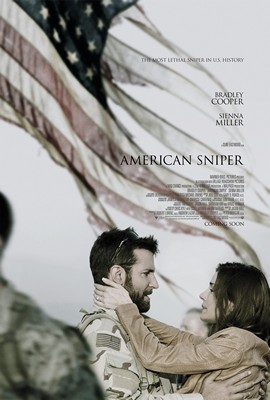
American Sniper, Clint Eastwood’s biopic about Navy SEAL Chris Kyle – “the most lethal sniper in US history” – has broken box office records and garnered six Academy Award nominations. Eastwood’s directing, Bradley Cooper’s acting and Jason Hall’s screenwriting have all been widely recognized as exemplary.
War films are often judged by their realism and accuracy: the claustrophobic intensity of Das Boot, the epic violence of Saving Private Ryan’s beach assault, the daring nighttime ambush of bin Laden’s compound in Zero Dark Thirty. For its battle scenes alone, American Sniper undoubtedly merits inclusion in that list – not just for the accuracy of military minutiae, but also for powerfully conveying the feeling of fighting in the streets of Iraq.
Intercut with these intense combat scenes, American Sniper presents Kyle’s story in an earnestly straightforward manner: a down-and-out cowboy signs up for the military in order to defend America, excels at his job (killing people) beyond all expectations, wrestles with the psychological trauma of war, overcomes that trauma by helping other veterans learn to shoot, and is finally celebrated as a hero.
But while every film must necessarily edit and shape its narrative into a coherent and engaging structure, American Sniper does so in a particularly pernicious way. As we are lured in by the adrenaline-fueled intensity of the combat scenes, we also are subjected to a highly selective and carefully cultivated depiction of the rest of Kyle’s life.
By all accounts – including his own – Kyle was not simply a humble Texan doing his duty to protect America. The real life Kyle was a far more complicated individual, driven by a complex set of circumstances and motivations. He relished killing and relished the recognition that resulted from his battlefield exploits. Ego, ambition, anger, alcoholism, and PTSD were all potent forces in his life. When we gloss over these facets of Kyle’s life, we gloss over his humanity, and we lose the perspective that is necessary to honestly evaluate war and violence.
Eastwood’s film has been lauded for its even-handed approach and its lack of an overt agenda. New Yorker film critic David Denby called American Sniper “both a devastating war movie and a devastating antiwar movie.” But by expunging Kyle’s lies and half-truths about his off-the-battlefield exploits, by framing Kyle’s military heroics in terms of a fabricated snipers’ duel, by streamlining the often devastatingly insurmountable struggles of PTSD, by paying mere lip-service to the moral dilemmas of modern warfare, and by portraying Kyle as a humble, even reluctant, hero, Eastwood does a disservice to the truth, and a disservice to those who have died defending the truth.
Pablo Picasso said that “Art is a lie that makes us realize truth.” American Sniper is a lie that obscures the truth of war. In so doing it robs us of the truth of our humanity, shooting far wide of the mark of great filmmaking and great art.
 Dan Wilkinson
Dan Wilkinson
Dan is a writer, graphic designer and IT specialist. He lives in Montana, is married and has two cats. He blogs at CoolingTwilight.com.












